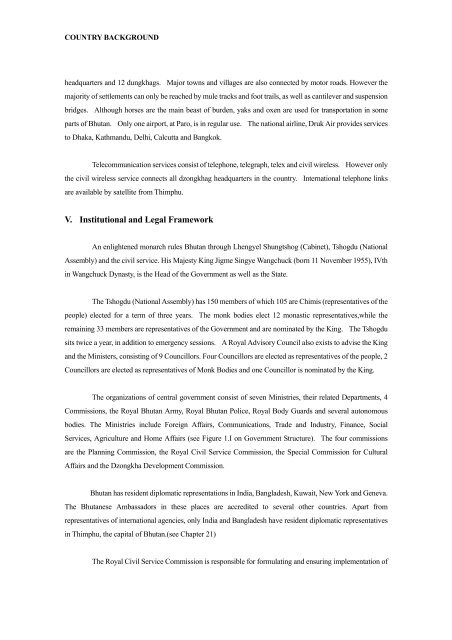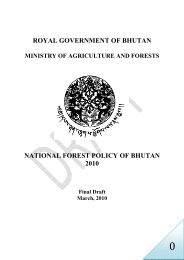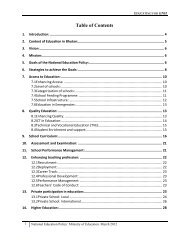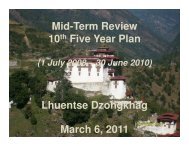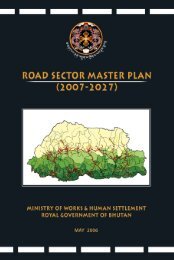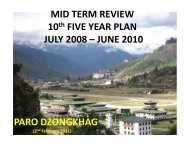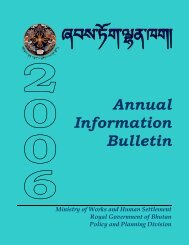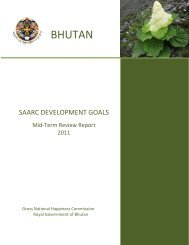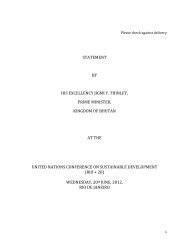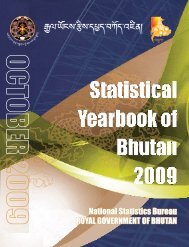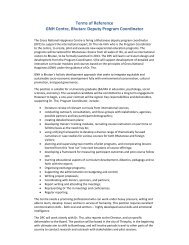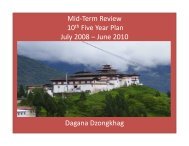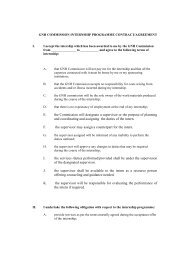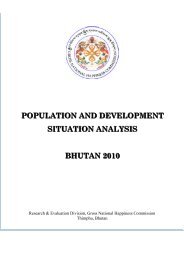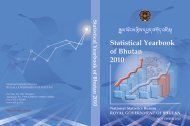COUNTRY BACKGROUND - Gross National Happiness Commission
COUNTRY BACKGROUND - Gross National Happiness Commission
COUNTRY BACKGROUND - Gross National Happiness Commission
Create successful ePaper yourself
Turn your PDF publications into a flip-book with our unique Google optimized e-Paper software.
<strong>COUNTRY</strong> <strong>BACKGROUND</strong><br />
headquarters and 12 dungkhags. Major towns and villages are also connected by motor roads. However the<br />
majority of settlements can only be reached by mule tracks and foot trails, as well as cantilever and suspension<br />
bridges. Although horses are the main beast of burden, yaks and oxen are used for transportation in some<br />
parts of Bhutan. Only one airport, at Paro, is in regular use. The national airline, Druk Air provides services<br />
to Dhaka, Kathmandu, Delhi, Calcutta and Bangkok.<br />
Telecommunication services consist of telephone, telegraph, telex and civil wireless. However only<br />
the civil wireless service connects all dzongkhag headquarters in the country. International telephone links<br />
are available by satellite from Thimphu.<br />
V. Institutional and Legal Framework<br />
An enlightened monarch rules Bhutan through Lhengyel Shungtshog (Cabinet), Tshogdu (<strong>National</strong><br />
Assembly) and the civil service. His Majesty King Jigme Singye Wangchuck (born 11 November 1955), IVth<br />
in Wangchuck Dynasty, is the Head of the Government as well as the State.<br />
The Tshogdu (<strong>National</strong> Assembly) has 150 members of which 105 are Chimis (representatives of the<br />
people) elected for a term of three years. The monk bodies elect 12 monastic representatives,while the<br />
remaining 33 members are representatives of the Government and are nominated by the King. The Tshogdu<br />
sits twice a year, in addition to emergency sessions. A Royal Advisory Council also exists to advise the King<br />
and the Ministers, consisting of 9 Councillors. Four Councillors are elected as representatives of the people, 2<br />
Councillors are elected as representatives of Monk Bodies and one Councillor is nominated by the King.<br />
The organizations of central government consist of seven Ministries, their related Departments, 4<br />
<strong>Commission</strong>s, the Royal Bhutan Army, Royal Bhutan Police, Royal Body Guards and several autonomous<br />
bodies. The Ministries include Foreign Affairs, Communications, Trade and Industry, Finance, Social<br />
Services, Agriculture and Home Affairs (see Figure 1.I on Government Structure). The four commissions<br />
are the Planning <strong>Commission</strong>, the Royal Civil Service <strong>Commission</strong>, the Special <strong>Commission</strong> for Cultural<br />
Affairs and the Dzongkha Development <strong>Commission</strong>.<br />
Bhutan has resident diplomatic representations in India, Bangladesh, Kuwait, New York and Geneva.<br />
The Bhutanese Ambassadors in these places are accredited to several other countries. Apart from<br />
representatives of international agencies, only India and Bangladesh have resident diplomatic representatives<br />
in Thimphu, the capital of Bhutan.(see Chapter 21)<br />
The Royal Civil Service <strong>Commission</strong> is responsible for formulating and ensuring implementation of


